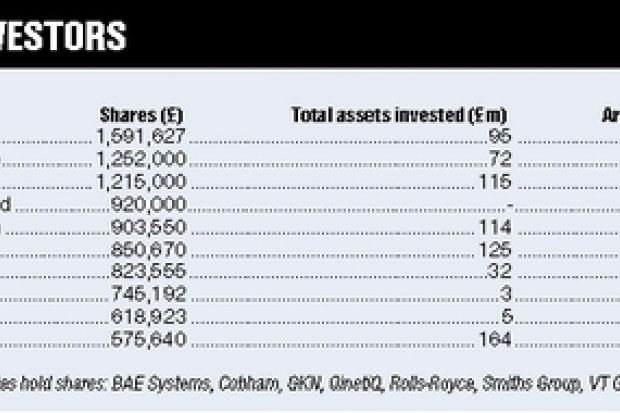Pressure to disinvest mounts as universities are named and shamed in arms trade asset revelations. Jessica Shepherd reports.
Universities are facing mounting pressure from academics and students to call a halt to their multi-million-pound investments in arms companies.
A report by Campaign Against the Arms Trade, published earlier this month, reveals that UK universities invest more than £15 million in the arms trade.
The non-governmental organisation used the Freedom of Information Act to force universities to divulge how many shares they held in arms firms.
Academics at University College London, which holds shares worth £1.59 million - the highest of any institution - are lobbying senior management to drop arms investments altogether.
St Andrews and Manchester universities are developing ethical investment policies as a result of staff campaigns.
The School of Oriental and African Studies and the University of Wales, Bangor, caved in to pressure last year when a similar report was produced and published exclusively in The Times Higher .
King's College London sold its shares in arms company BAE Systems earlier this year but kept other arms investments.
Sean Wallis, a senior research fellow in English at UCL and the institution's union branch secretary, said: "It is a matter of great concern that if UCL has investments in arms companies. The University and College Union is concerned about the way in which the arms trade has impacted on institutions, both at a local and a national level."
The CAAT discovered that UK universities held at least £15 million-worth of arms trade shares.
Apart from UCL, the biggest investors were Cambridge University's Trinity Hall, which has arms shares worth £1.25 million, and Liverpool University, which has shares worth £1.21 million.
Other universities with large investments are Hull, York and Manchester universities, King's College London (even after its decision to divest from BAE) and Oxford's New College, Nuffield College and St Hilda's.
Some 45 universities and university colleges admitted that they owned shares in at least one top arms firm, while 33 universities refused to divulge the information.
The CAAT examined investments in UK-based firms BAE Systems, Cobham, GKN, QinetiQ, Rolls-Royce, Smiths Group and VT Group.
Among the military equipment they manufacture are warships and planes such as the B-2 bomber, the F-16 fighter and the A-10A "tank-buster".
Cobham's components were used in the US hellfire missiles blamed for civilian deaths in Iraq. Smiths supplies trigger systems for Apache attack helicopters and VT Group is one of the world's largest warship manufacturers.
Academics critical of arms investment described the number of university shares in the companies as a "scandal".
Tom Stafford, a lecturer in psychology at Sheffield University, said: "For a public institution to invest in arms companies is a disgrace. I think it utterly contradicts the ideal of working for the public good that a university should embrace. We can't go on pretending that arms investments are morally neutral."
Dan Hodson, a meteorology lecturer at Reading University, said:
"Universities should be investing more ethically. I would encourage academics to lobby their universities."
Malcolm Grant, vice-chancellor of UCL, has written a defence of arms investments in a staff newsletter published this week. In it, he wrote that UCL invested in companies that had involvement with the supply of strategic parts of weapons systems, but that did not "manufacture entire weapons systems themselves."
A Liverpool University spokesman said: "The university has a legal obligation to maximise returns on its investments as it is accountable to its beneficiaries. We would not choose to invest in arms if other opportunities to fulfil our financial obligations were equally available.
"We expect those who invest on behalf to take an active ethical stance.
Many of the companies that have arms interests also have substantial other industrial interests."
A spokeswoman from BAE Systems said: "We are committed to meeting the highest ethical standards in our dealings with others. We understand that there are those who disagree with us, and we respect their views."
jessica.shepherd@thes.co.uk </a>
Register to continue
Why register?
- Registration is free and only takes a moment
- Once registered, you can read 3 articles a month
- Sign up for our newsletter
Subscribe
Or subscribe for unlimited access to:
- Unlimited access to news, views, insights & reviews
- Digital editions
- Digital access to THE’s university and college rankings analysis
Already registered or a current subscriber?
